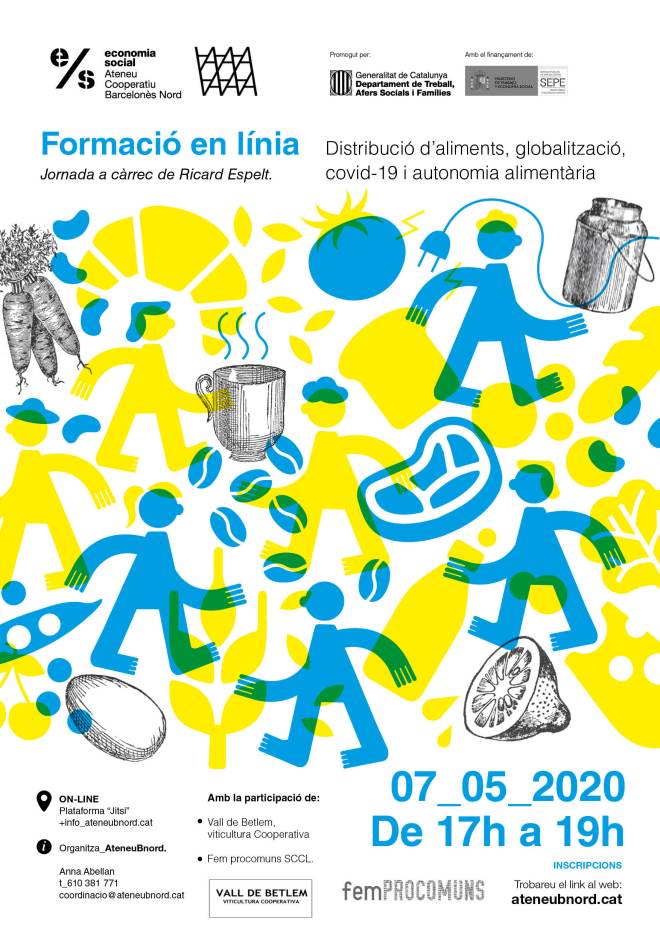This post is also available in: Español (Spanish) English
El proper dijous 7 de maig de 2020 de 17 a 19 hores en Ricard Espelt farà una formació online amb l’Ateneu Cooperatiu Barcelonès Nord on tractarà sobre el disbarat de la producció i distribució d’aliments globalitzada, el paper de Mercabarna i la distribució d’aliments i l’alternativa del consum agroecològic a Catalunya, així com els reptes i evidències del canvi que cal fer i que són encara més evidents arran de la crisi del COVID-19.
La formació es fa en el marc del projecte Singulars Vall de Betlem i és gratuïta, però les places són limitades i cal inscriure’s prèviament.
Aquesta formació és el punt d’arrencada de la col·laboració de la cooperativa integral femProcomuns amb l’Ateneu Cooperatiu Barcelonès Nord; la propera activitat que es farà conjuntament serà una formació sobre com col·laborar al projecte de cartografia oberta Open Street Map el dimecres 13 de maig.

La sessió sobre distribució d’aliments durarà dues hores, es farà per videoconferència, es disposarà d’un document per prendre apunts col·laboratius i constarà de 3 parts:
1) Producció, distribució i consum d’aliments a escala global i a Catalunya en concret:
- Quin és el model de consum en l’àmbit global?
- Quins són els impactes?
- Quins són els màxims agents d’aquest model dominant?
- A Catalunya el model és el mateix?
En aquesta primera part s’analitzarà la concentració de poder que té el model de producció, distribució i consum d’aliments a escala global i l’impacte econòmic, social i mediambiental que provoca. Analitzarem holísticament que és la traçabilitat dels aliments i com podem identificar-la.
2) Alternatives al model de producció, distribució i consum global:
- Què són els circuits curts de comercialització?
- Què és l’agroecologia?
- Què entenem per sobirania alimentària?
- Quines iniciatives hi ha a Catalunya en aquest àmbit?
En la segona part es farà un repàs a les alternatives que han sorgit per contrarestar el model dominant. Es farà una anàlisi històrica, social, econòmica i política del seu desenvolupament a Catalunya i es facilitaran una sèrie de recursos per identificar aquestes alternatives.
3) Tendències en el consum d’aliments i l’impacte de la COVID-19:
- Quines són les principals tendències en el consum d’aliments en l’actualitat?
- Quines amenaces i oportunitats es deriven d’aquestes tendències?
- Què ha mostrat la crisi de la pandèmia de la COVID-19?
- Quines iniciatives han sorgit i com poden ajudar a promoure un canvi d’escala en el model de consum d’aliments dominant?
- Quines són les claus perquè aquest canvi es produeixi?
La darrera part de la sessió té l’objectiu d’aproximar a les persones que hi participin en l’impacte que les plataformes digitals tenen en el consum d’aliments i quines oportunitats i amenaces s’obren a partir d’aquest fenomen. Finalment, veurem quines iniciatives han sorgit en el marc de la crisi provocada per la pandèmia de la COVID-19 i com podem recolzar-les com a persones consumidores.
- Dijous 7 de maig de 2020
- 17 a 19 hores
- Inscripció

2 Responses